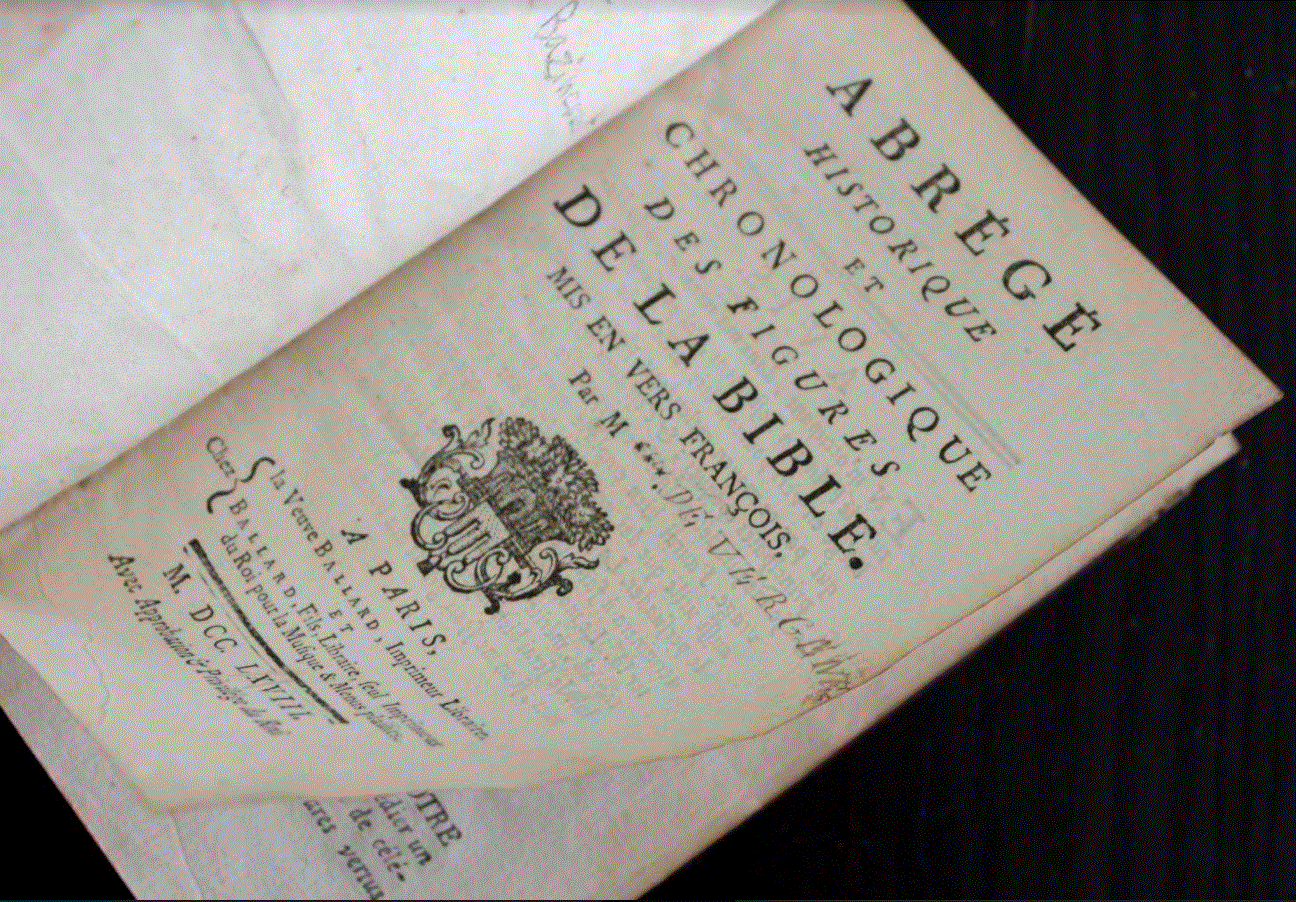Mademoiselle de Bazincourt: Style Defines The Man and the Woman
- by Thibault Ehrengardt

Style defines the man, Georges-Louis Leclerc de Buffon once said—it also defines the woman, of course; but it was less frequently underlined in the 18th century. That’s probably one of the reasons why there’s not much to say about the little book entitled Abrégé Historique et Chronologique des Figures de la Bible, mis en vers françois / Historical And Chronological Abridgement Of The Biblical Figures, Written In French Verses (Veuve Ballard, 1768). A very good book, but written by a Mademoiselle—Mademoiselle Thomas de Bazincourt, to be precise. A woman, yes—and a reclusive one.
A copy of this book was offered for sale the other day in Paris—a nice in-12 volume, a bit worn out but bound in full contemporary glazed leather with golden lines on the boards. You could tell by holding it in the palm of your hand that the binder did a good job. Bazincourt’s name doesn’t appear on the title page, which only reads “by M ***”. A reader handwrote “by De Vergennes” on the title page of our copy, a reference to Charles Gravier de Vergennes (1719-1787), a Secretary of State of Louis XVI. But on the front page, a bookseller noted: “By Mademoiselle Thomas de Bazincourt”—and then, among some cabalistic numbers so dear to booksellers, he added “Very rare.” The Privilege, bound at the end of the book partly confirms: “La Demoiselle Thomas de B*** let us know that she desired to print and sell a book by the title of Abrégé chronologique et historique de la Bible en vers françois de sa composition, should we agree to give her the required Letters of Permission to do so.” The privilege was granted—“CAR TEL EST NOTRE BON PLAISIR”—in December 1767, shortly before publication. But the book first needed to be approved. Accordingly, Mr Cotterel, Doctor of the House & Society of La Sorbonne, and Priest of Saint Laurent, read the manuscript in June 1767 by order of the Vice-Chancellor. He could therefore affirm: “it contains nothing that goes against faith or morality.” Thank God, the book was good to go.
It was published by La Veuve Ballard and her son, Ballard Fils—“the only printer of the King regarding music and small pleasures.” In a very short preface, the author writes: “While reading the Old Testament in my retreat, I thought that an abridged version in verses would be useful to the youth. (...) Such a motivation deserves your indulgence.” That’s all we know about Miss Bazincourt, as well as a few details given by Fortunée B. Briquet in her Historical and Bibliographical Dictionary of French Women (Paris, 1804): “She was a King’s resident at the Abbey of Long-Champ, and she published an Abridged Bible, in French verses, 1768—in-12. This work is dedicated to the Queen. The clarity, fidelity and a swift precision are the main qualities of this book. Several parts are happily rendered.” That’s it. Those who did talk about her afterwards only reproduced Briquet’s short notice. We will probably never know what she looked like. Let’s focus on her labour of love, then. After a couple of ordinary verses, we are suddenly carried away by a powerful and refreshing gale as the Word strikes our minds with strength and simplicity—the sounds of the words and the rhythm of the verses create this unique energy known to all poetry lovers.
From the bottom of emptiness, God extracted numerous swirls,
He alone made the skies and the luminous bodies
That shed on us the light that brightens our lives,
He made the Earth, a globe, upon which we trod,
Therein enclosed all fruitful principles
Which of the weak us support the existence.
The dramaturgy of the Genesis is particularly well rendered:
All by herself, Eve gazed upon the fruitful horizons
The serpent nurtured in her bosom the prideful desire
To possess the divine secrets (...)
She contemplated, ate the fruit, which in her hands
The humans’ enemy had cunningly placed,
Of trouble and death the enchanting source
Carried into her veins a flattering dizziness.
Obviously, this quick translation doesn’t give her dazzling talent credit. The book, or the poem stops at the end of the Biblical fifth age. “Depending on how this first part is received,” she writes, “I shall or shall not publish the second part.” Unfortunately, the second part never saw the light of day. We are left with a “goût de trop peu” (a taste of not-enough), as we imagine a young and beautiful Mademoiselle, lost in the emptiness of her holy retreat from where she extracted many swirls of verses, burning with a consuming passion for the Holy Scriptures, and versification. This is a romantic vision, of course; but if style defines the woman, then that’s what Mademoiselle Thomas de Bazincourt will always look like to me.
Thibault Ehrengardt
- Collation: Title Page, Epistle (1pp), 138 pp, Privilege and Approbation (1pp).